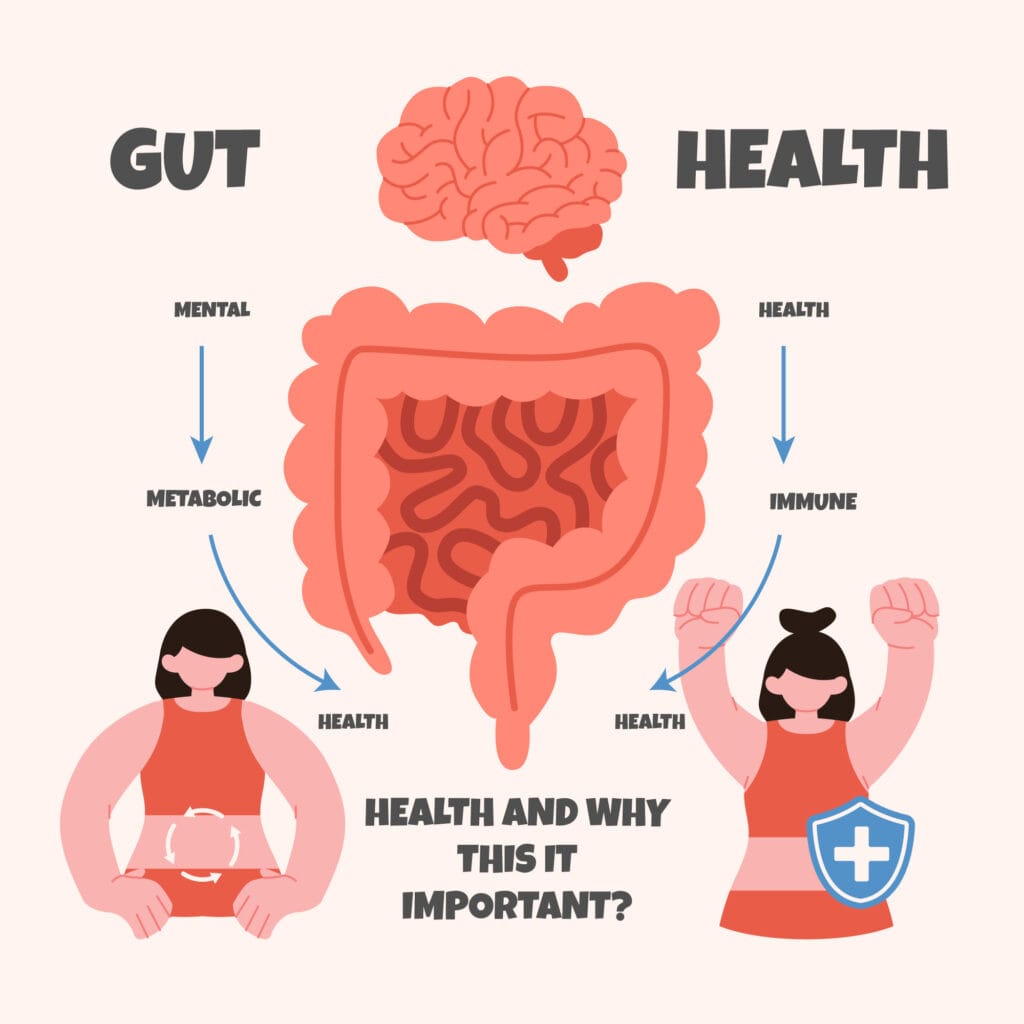FREE SHIPPING OVER $50
Your Gut Controls Your Mood & Weight? New Science Explains The Gut-Brain Anxiety Link

Have you ever found yourself battling persistent anxiety or struggling with stubborn weight gain, despite trying all the “usual” solutions? It can feel incredibly frustrating, like there’s a missing piece to the puzzle. What if that missing piece wasn’t in your head, or even on your plate, but deep inside your belly?
It might sound wild, but cutting-edge research is revealing a revolutionary truth: your gut doesn’t just digest your food; it actively communicates with your brain, profoundly influencing your mood and even your metabolism. This powerful connection, known as the gut-brain axis, is changing how we understand everything from anxiety to weight loss.
The Second Brain: A Revolution in Health Understanding
For centuries, science largely viewed the gut as a simple digestive tube. But recent discoveries have shattered that limited view. We now understand that your gut is home to trillions of microorganisms—bacteria, viruses, fungi—collectively known as your gut microbiome. This bustling inner world is so complex and influential that scientists often refer to your gut as your “second brain.”
Why “second brain”? Because your gut possesses its own intricate nervous system, the enteric nervous system (ENS), which is embedded in the walls of your digestive tract. This ENS doesn’t just manage digestion; it’s constantly in two-way communication with your actual brain via a superhighway of nerves, hormones, and immune pathways. The most famous of these connections is the vagus nerve, a direct neural link between your gut and your brain.
This means that what’s happening in your gut can directly send signals to your brain, impacting everything from your emotions and cognitive function to your body’s energy balance and weight. It’s a game-changer in how we approach health and wellness.
How Your Gut Microbiome Influences Mood & Anxiety
If you’ve experienced unexplained anxiety, persistent low mood, or struggled to manage stress, your gut microbiome might be playing a much bigger role than you ever imagined. Here’s how this intricate system can affect your mental well-being:
- Neurotransmitter Production Powerhouse: Did you know that a vast majority of the body’s serotonin (the “feel-good” neurotransmitter) is produced in your gut, not your brain? Your gut microbes play a crucial role in manufacturing neurotransmitters like serotonin, dopamine, and GABA. When your gut microbiome is out of balance (dysbiosis), this production can suffer, potentially contributing to feelings of anxiety and depression.
- Stress Response System: An unhealthy gut can heighten your body’s stress response. Gut dysbiosis can lead to increased production of stress hormones like cortisol. Elevated cortisol levels are directly linked to chronic stress and anxiety, creating a vicious cycle where stress harms the gut, and the compromised gut makes you more susceptible to stress and anxiety.
- Inflammation Signalers: When your gut microbiome is unbalanced, it can lead to a condition called “leaky gut” or increased intestinal permeability. This allows harmful substances to pass from your gut into your bloodstream, triggering low-grade, systemic inflammation. This inflammation can disrupt normal brain function, contributing to anxiety, brain fog, and other neurological symptoms.
- Vagus Nerve Whispers: The vagus nerve acts like a direct phone line between your gut and your brain. Gut microbes can influence signals sent along this nerve. If your gut isn’t happy, it can send negative signals to your brain, impacting your mood and stress levels.
The Gut-Weight Connection: More Than Just Calories In, Calories Out
The journey to sustainable weight loss isn’t just about counting calories or macros. New science shows your gut has a surprising influence over your metabolism and how your body stores fat.
- Calorie Extraction and Fat Storage: Different types of gut bacteria are more efficient at extracting calories from the food you eat. Some types can extract more calories from the same amount of food, potentially leading to weight gain even if your calorie intake seems moderate. Certain microbial profiles have also been linked to increased fat storage.
- Satiety Hormones and Cravings: Your gut microbiome plays a role in regulating hormones that control appetite and satiety, such as leptin (which signals fullness) and ghrelin (which signals hunger). An imbalanced gut can disrupt these signals, leading to increased cravings, feeling less full after meals, and a constant battle against hunger, making weight loss feel like an uphill climb.
- Insulin Resistance and Inflammation: An unhealthy gut microbiome can contribute to chronic, low-grade inflammation throughout the body. This inflammation is a known driver of insulin resistance, a condition where your cells don’t respond effectively to insulin. This leads to higher blood sugar levels and increased fat storage, especially around the midsection.
- Short-Chain Fatty Acids (SCFAs): Your beneficial gut bacteria produce these amazing compounds, like butyrate, when they ferment fiber from your diet. SCFAs are crucial for maintaining a healthy gut barrier, but they also influence metabolism, improve insulin sensitivity, and can even help regulate appetite, positively impacting weight management.
The Gut-Brain-Anxiety-Weight Loop: A Vicious Cycle (and How to Break It)
Here’s where the connections truly intertwine:
- Stress/Anxiety Impacts Gut: High stress and anxiety (whether from the outside world or an imbalanced gut) can directly alter your gut microbiome, increasing harmful bacteria and reducing beneficial ones.
- Unhealthy Gut Impacts Food Choices: A disrupted gut can lead to cravings for sugary, processed foods (which feed the “bad” bacteria), making it harder to stick to a healthy diet.
- Poor Food Choices Worsen Gut & Mood: Consuming these unhealthy foods further imbalances the gut, creating more inflammation and disrupting neurotransmitter production, which then fuels more anxiety and negative mood.
- Weight Gain Ensues: This cycle of inflammation, disrupted hormones, and poor food choices often culminates in weight gain, adding another layer of frustration and potentially increasing anxiety.
Nurturing Your Gut: Actionable Steps for Better Mood & Weight Management
- Embrace a Diverse, Whole-Food Diet: This is the absolute cornerstone of a healthy gut.
- Load Up on Fiber (Prebiotics): Fiber is the fuel for your beneficial gut bacteria. Focus on a wide variety of plant-based foods like fruits, vegetables, whole grains (oats, quinoa, brown rice), nuts, seeds, and legumes (beans, lentils). Aim for at least 25-30 grams daily.
- Incorporate Fermented Foods (Probiotics): These introduce beneficial bacteria directly to your gut. Think plain yogurt with live cultures, kefir, sauerkraut, kimchi, miso, tempeh, and kombucha. Start small and gradually increase.
- Limit Processed Foods & Added Sugars: These foods feed harmful bacteria, promote inflammation, and negatively impact your gut microbiome. Reduce your intake of sugary drinks, fast food, and packaged snacks.
- Include Healthy Fats: Omega-3 fatty acids (from fatty fish like salmon, flaxseeds, chia seeds) support both brain health and reduce inflammation.
- Hydrate Wisely: Water is vital for digestive function, helping fiber move through your system and supporting overall gut health. Aim for plenty of pure, filtered water throughout the day.
- Manage Stress Effectively: Chronic stress is a powerful disruptor of the gut microbiome. Find strategies that work for you:
- Meditation or mindfulness
- Yoga or deep breathing exercises
- Spending time in nature
- Engaging in hobbies you enjoy
- Connecting with loved ones
- Prioritize Quality Sleep: Poor sleep impacts both your gut and your brain. Aim for 7-9 hours of restful sleep each night to allow your body to repair and reset.
- Move Your Body Regularly: Regular exercise has been shown to positively alter the gut microbiome, increasing its diversity and the abundance of beneficial bacteria. Even a moderate daily walk can make a difference.
- Consider Supplements (Cautiously): While food is always best, targeted probiotic or prebiotic supplements might be beneficial for some individuals, especially after antibiotic use or during specific health challenges. Always consult with a health professional before starting any new supplement regimen.
Conclusion
Understanding the gut-brain axis is a powerful new tool in your health arsenal. It moves beyond simply treating symptoms and instead empowers you to address root causes. By intentionally nurturing your gut health, you’re not just aiming for weight loss or reduced anxiety; you’re building a foundation for holistic, long-term well-being.
This isn’t a quick fix, but a journey of consistent, positive choices. Every bite of whole food, every mindful breath, and every restful night’s sleep contributes to a thriving gut microbiome that will, in turn, support a happier mood and a healthier weight.
Related Articles
- Beyond Probiotics: Postbiotics Are The Ultimate Gut Health Secret (Top 5 Foods & Supplements)
- Wrecking Your Gut? Avoid These 5 Common Habits That Cause Bloating, Brain Fog & More
- The Gut Health Game-Changers: 5 Foods That Outrank Sauerkraut for a Thriving Microbiome
- Constipated? These 5 Drinks Are Your Instant Bathroom Pass (Seriously!)
- Kefir’s Gut Secret: What Happens to Your Body 30 Days After You Start Drinking It!







